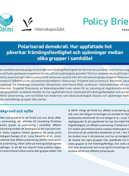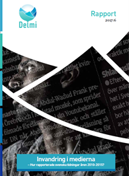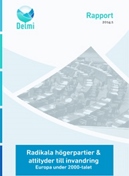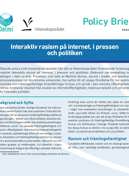The party political landscape in Sweden has changed in a short time and migration issues are a hot topic. Both in Europe and in the Nordic countries, radical right-wing populist parties have had great success in recent times, but the treatment of these parties looks very different. This report is about how Swedish newspapers on their editorial pages describe the Sweden Democrats (SD) in comparison with how other radical right-wing populist parties are described in Denmark, Norway and Finland. The first study compares how the leading pages of Nordic mainstream newspapers described radical right-wing populist parties. The second sub-study examines a series of articles on the internet site Avpixlat where SD sympathizers tell why they choose to vote for SD.
Some overall conclusions and recommendations
- There was no major change in how SD was treated on the country's leadership pages during the period 2009–2012. Sweden stands out in comparison with how corresponding parties are handled on the leadership sides in the neighboring countries Norway, Denmark and Finland.
- The reporting in the media during the period examined was based on the voters having a choice to either vote for the Sweden Democrats or one of the other parliamentary parties, which may have contributed to the polarization in Swedish politics.
- Regarding the article series in Avpixlat, it is concluded that there are several places for public talks, and the alternatives to mainstream media play an important role for a party that is not part of the establishment.
- The starting point for Avpixlat is that everything was better before, that Sweden can not cope with more immigrants, that the costs of migration policy are rising, that there is reason to feel concern about the lack of leadership and that other countries should take increased responsibility for asylum reception.
- Based on such a description of reality, a vote for the Sweden Democrats is understandable and logical, despite the mainstream press' distancing itself. The stories conveyed on Avpixlat contain both nostalgia and promises of a different and better future, even if it is more about recreating something that has been lost. There is reason to believe that readers perceive the other parliamentary parties as visionless.
About the report authors
The report, Migration, political parties and media in the Nordic countries (2016:6), is written by Anders Hellström, Associate Professor of Political Science at Malmö Institute for Studies of Migration, Diversity and Welfare (MIM), Malmö University, and Anna-Lena Lodenius, journalist and author.
Picture by AbsolutVision from Unsplash.





